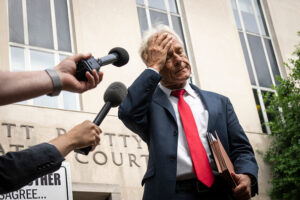Peter Navarro Is Headed For The Hoosegow
Unless the DC Circuit does him a solid.

(Photo by Drew Angerer/Getty Images)
Peter Navarro would like to stay out of jail, please.
Trump’s White House econ crank got himself in a hot, hot mess when he decided to dress up as a lawyer and tell Congress to get bent in response to a subpoena from the January 6 Select Committee in February of 2022. The committee had questions about Navarro’s plot with putrefying podcaster Steve Bannon to overturn the 2020 election by delaying the certification on January 6 — a topic which could not possibly be covered by executive privilege.

Happy Lawyers, Better Results The Key To Thriving In Tough Times
Nevertheless, after dashing off a letter lecturing the committee on on the finer points of executive privilege, Navarro simply refused to show up or engage at all. In June of that year, he was shocked and chagrined to find himself indicted for contempt of Congress. Apparently just shouting PRIVILEGE and sticking two middle fingers in the air doesn’t count as a legitimate invocation. Who knew!
That’s a trick question, of course. Everyone knew — or everyone but Bannon and Navarro, at any rate. That’s why almost everyone else had the sense to hire a lawyer and then show up to plead the Fifth or invoke executive privilege in response to specific questions.
On the eve of Navarro’s trial, Trump’s lawyer Evan Corcoran produced a letter purporting to reiterate his client’s position that “as one of his senior advisors, you had an obligation to assert executive privilege on his behalf and fully comply with the principles of confidentiality stated above when you responded to the Committee’s subpoena.”
That was a bit of déjà vu all over again, since Steve Bannon pointed to just such a generalized statement from Trump’s counsel to justify his own refusal to cooperate with Congress. And indeed, Navarro was no more successful running this play than his buddy. Like Judge Carl Nichols, Judge Amit Mehta ruled that there was no evidence that Trump had invoked privilege at all, and even if he had, that wouldn’t have relieved Navarro’s obligation to show up and refuse to answer specific questions, much less produce documents.
Sponsored

Law Firm Business Development Is More Than Relationship Building

Curbing Client And Talent Loss With Productivity Tech

Happy Lawyers, Better Results The Key To Thriving In Tough Times

AI Presents Both Opportunities And Risks For Lawyers. Are You Prepared?
Both jurists cited Licavoli v. United States, in which the DC Circuit held that “Advice of counsel cannot immunize a deliberate, intentional failure to appear pursuant to a lawful subpoena lawfully served,” in support of the proposition that the defendants’ states of mind were of no moment to a contempt of Congress charge. The only relevant data point was whether Navarro and Bannon knew they were subpoenaed and failed to show up — check, and check.
The jurors convicted Navarro in about two hours, and Judge Mehta sentenced him to four months in custody. Navarro hoped to suspend his sentence pending appeal, but unlike Judge Nichols, Judge Mehta wasn’t budging. Navarro then moved for a stay of his sentence from the DC Circuit.
His argument, such as it is, boils down to “the trial judge was wrong, don’t lock me up.” His attorney Stan Brand actually claimed that Judge Mehta had an obligation to disregard Licavoli, on the assumption that the appellate court would take the opportunity to overturn it.
The government’s argument concerning the continued validity of Licavoli v. United States, 294 F.2d 207 (D.C. Cir. 1961), rests on the faulty and fragile assumption that this Court will continue to treat Licavoli as binding precedent despite the obvious damage such a conclusion would have on the doctrine of executive privilege as an important linchpin of the constitutional separation of powers doctrine.
The court has not availed itself of any such opportunity in Bannon’s case, but … the night is still young. And Navarro got an auspicious panel, drawing Judges Karen LeCraft Henderson, Patricia Millett, and Justin Walker for his appeal. (Dammit, no Neomi Rao!)
Sponsored

Generative AI at Work: Boosting e-Discovery Efficiency for Corporate Legal Teams

AI Presents Both Opportunities And Risks For Lawyers. Are You Prepared?
Last night, Navarro filed an emergency motion informing the court that the Bureau of Prisons has now specified a surrender date of March 19 in Miami, so TICK TOCK, YOUR HONORS.
Should the appeals panel fail to let him screw around for several months and hope that Trump gets back in office in time to pardon him, Navarro would like an administrative stay to allow him time to race to the Supreme Court for relief.
It’s a bold strategy, Cotton. Let’s see if it pays off.
US v. Navarro [DC Circuit Docket via Court Listener]
US v. Navarro [Trial Docket via Court Listener]
Liz Dye lives in Baltimore where she produces the Law and Chaos substack and podcast.







